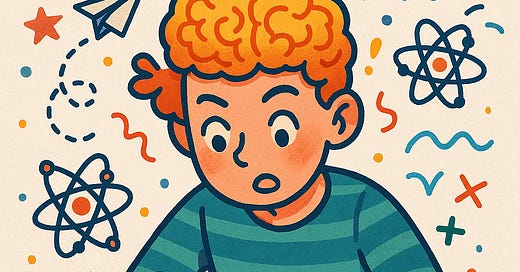How ADHD Brains Learn New Skills
ADHD brains are fascinating learning machines – just ones that operate a bit differently. The typical learning path for neurotypical folks often doesn't match how our dopamine-seeking minds work.
The ADHD Learning Cycle
Research shows ADHD brains tend to learn in what I call the "intensity cycle":
Intense hyper-focus stage – When something catches our interest, we dive DEEP. This is where the dopamine reward system kicks in, making learning feel rewarding and almost addictive.
Plateau/boredom stage – Once the novelty wears off, maintaining interest becomes challenging. This is when many ADHD learners abandon projects.
Practical application stage – If we push through the plateau, we enter a phase where skills become useful in real-world contexts.
The challenge is that most ADHD folks get stuck in stages 1-2, bouncing between different interests without developing mastery.
Effective Skill Development Strategies
Recent research from the University of Pennsylvania suggests these approaches work particularly well:
Interest-based learning – Connect skills to your genuine interests. Dr. Russell Barkley's work shows ADHD brains respond much more strongly to intrinsic motivation than external rewards.
Chunking complex skills – Break larger skills into smaller, achievable components that provide more frequent dopamine hits.
Body-doubling and accountability – Having someone physically present (or virtually) while learning triggers social motivation circuits that can compensate for executive function challenges.
Skill stacking – Instead of mastering one skill completely, develop several complementary skills to a "good enough" level. This approach, highlighted in Scott Adams' work, plays to ADHD strengths of cross-disciplinary thinking.
Aligning Skills With Goals
Here's where things get tricky – how do you stick with skills that matter for your goals?
Visual anchoring – Create physical reminders of your goals. Research from 2023 by Safren and colleagues shows visual cues significantly improve goal persistence in ADHD adults.
Implementation intentions – "When X happens, I will do Y with this skill." This technique creates automatic behavioral triggers that bypass executive function.
Success spirals – Start with micro-accomplishments to build momentum. Each small win creates dopamine reinforcement that makes the next step easier.
Environmental design – Structure your physical and digital spaces to reduce friction for practicing important skills. Remove distractions that compete for attention.
The newest research on ADHD learning suggests that "interest bridging" – connecting necessary-but-boring skills to existing intense interests – can be transformative. For example, if you love gaming but need to learn coding, find ways to create game mods first rather than starting with abstract programming concepts.
What specific skills are you trying to develop right now? I'd be happy to explore how to apply these concepts to your situation.




Great advice! I find my greatest difficulty is taking on too much and never having enough time for all of it. Thanks! 👍